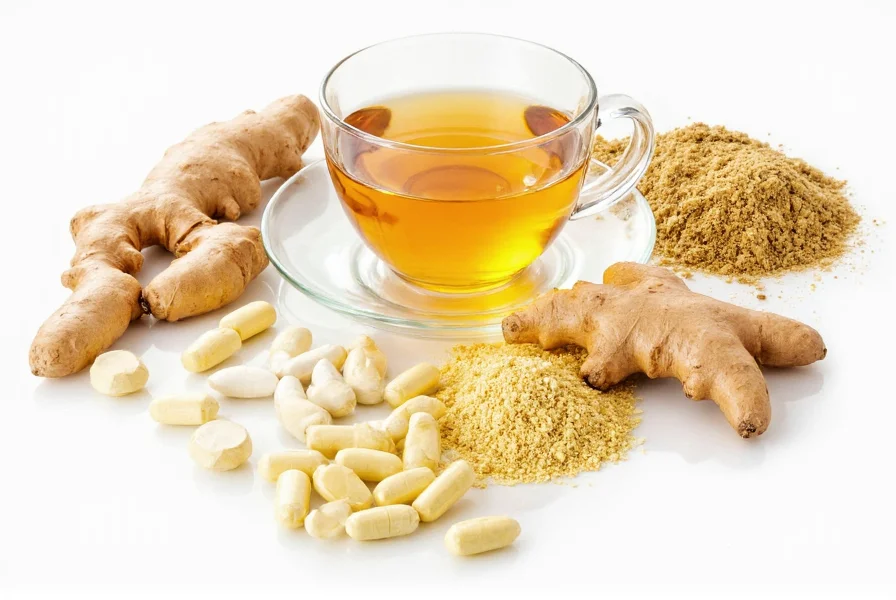Ginger (Zingiber officinale) has been valued across cultures for thousands of years, not just as a kitchen staple but as a therapeutic botanical. This knotted rhizome contains bioactive compounds like gingerols and shogaols that deliver potent physiological effects. Modern research continues to validate many traditional uses while uncovering new applications for this versatile plant.
Culinary Applications of Ginger
Chefs worldwide rely on ginger's distinctive zesty, slightly sweet flavor profile to enhance both sweet and savory dishes. Fresh ginger root adds brightness to Asian stir-fries, marinades, and soups. Ground ginger features prominently in spice blends like curry powder and chai tea mixtures. The crystallized form provides a sweet-tart candy option, while pickled ginger serves as a palate cleanser in Japanese cuisine.

Medicinal Benefits Supported by Research
Multiple clinical studies confirm ginger's therapeutic potential for specific health concerns:
| Health Application | Scientific Support | Recommended Dosage |
|---|---|---|
| Morning sickness | Multiple studies show 70-85% symptom reduction | 1-1.5g daily in divided doses |
| Postoperative nausea | Significantly reduces symptoms compared to placebo | 1g before surgery |
| Osteoarthritis pain | Moderate evidence for pain reduction | 500mg-1g daily |
| Digestive motility | Stimulates gastric emptying by 25-50% | 2g before meals |
Digestive Health Enhancement
What is ginger good for regarding digestion? The compound gingerol stimulates digestive enzyme production while accelerating gastric emptying. People experiencing indigestion or bloating often find relief by consuming ginger tea before or after meals. Research published in the European Journal of Gastroenterology & Hepatology demonstrated ginger's ability to improve digestion by 25-50% compared to placebo.
Nausea and Vomiting Management
What is ginger helpful for nausea? Multiple systematic reviews confirm ginger's effectiveness for various nausea types. A comprehensive analysis in Obstetrics & Gynecology found ginger reduced pregnancy-related nausea by 27% compared to placebo. Cancer patients undergoing chemotherapy also report decreased nausea severity when using ginger supplements alongside standard antiemetics.
Anti-Inflammatory Properties
What is ginger used to treat inflammation? The active compounds in ginger inhibit inflammatory pathways similar to NSAIDs but without the gastrointestinal side effects. Studies show ginger extract reduces markers of inflammation like C-reactive protein and interleukin-6. Athletes using ginger supplementation report less muscle soreness after intense exercise, while arthritis patients note improved joint mobility with regular use.
Practical Usage Guidelines
What is ginger root used for in daily practice? Different forms provide varying benefits:
- Fresh ginger: Best for immediate digestive support - grate 1-2 teaspoons into hot water for tea
- Dried powder: More concentrated - use 250-500mg capsules for nausea prevention
- Ginger extract: Standardized for consistent potency - follow product instructions
- Ginger essential oil: For topical application to sore muscles (diluted with carrier oil)

Safety Considerations
What is ginger effective for but with precautions? While generally safe, ginger may interact with blood-thinning medications due to mild anticoagulant properties. People with gallstones should consult physicians before regular consumption as ginger stimulates bile production. The maximum recommended daily intake is 4 grams for adults, though most therapeutic applications use 1-2 grams.
Pregnant women can safely use ginger for morning sickness under medical supervision, but should avoid excessive consumption during the first trimester. Children under 2 should not consume medicinal amounts of ginger without pediatric consultation.
Conclusion
What is ginger beneficial for in summary? This ancient remedy has earned its place in modern wellness practices through scientifically validated benefits for digestive health, nausea management, and inflammation reduction. Whether incorporated into daily cooking or used therapeutically for specific conditions, ginger offers a natural approach to supporting multiple aspects of health. As with any botanical intervention, consistency and appropriate dosing yield the best results while respecting individual health circumstances.
Frequently Asked Questions
What is ginger used for medically that has strong scientific backing?
Ginger has strong scientific evidence supporting its use for nausea relief, particularly morning sickness during pregnancy, postoperative nausea, and chemotherapy-induced nausea. Multiple studies also confirm its effectiveness for osteoarthritis pain management and improving digestive motility. The National Center for Complementary and Integrative Health recognizes these applications based on clinical research.
How much ginger should I take for digestive issues?
For digestive support, research suggests 1-2 grams of fresh ginger or 500-1000mg of dried ginger powder taken before meals. This typically equates to about 1-2 teaspoons of freshly grated ginger in tea or 1-2 standard capsules. Studies show this dosage significantly improves gastric emptying and reduces symptoms of indigestion without causing side effects in most people.
Can ginger help with motion sickness during travel?
Yes, ginger has been shown to be effective for motion sickness prevention. Taking 1 gram of ginger one hour before travel reduces symptoms of motion sickness by approximately 25-30% compared to placebo. Unlike pharmaceutical options, ginger typically doesn't cause drowsiness. For best results, use fresh ginger tea, capsules, or crystallized ginger starting the day before travel and continuing throughout your journey.
What's the difference between fresh and dried ginger for health benefits?
Fresh ginger contains higher levels of gingerol, which provides strong anti-nausea effects. Dried or cooked ginger develops more shogaols, which have enhanced anti-inflammatory properties. For digestive issues and nausea, fresh ginger is generally more effective. For inflammation and pain management, dried ginger or extracts may provide stronger benefits. Both forms offer health advantages, but the specific compounds activated depend on preparation method.
How long does it take for ginger to work for nausea relief?
The effects of ginger for nausea typically begin within 30-60 minutes after consumption, with maximum benefits occurring 1-2 hours later. For preventive use (like before surgery or travel), take ginger 1-2 hours beforehand. For existing nausea, fresh ginger tea often provides relief within 20-30 minutes. Consistent daily use yields better long-term results for chronic conditions like morning sickness or chemotherapy-related nausea.











 浙公网安备
33010002000092号
浙公网安备
33010002000092号 浙B2-20120091-4
浙B2-20120091-4